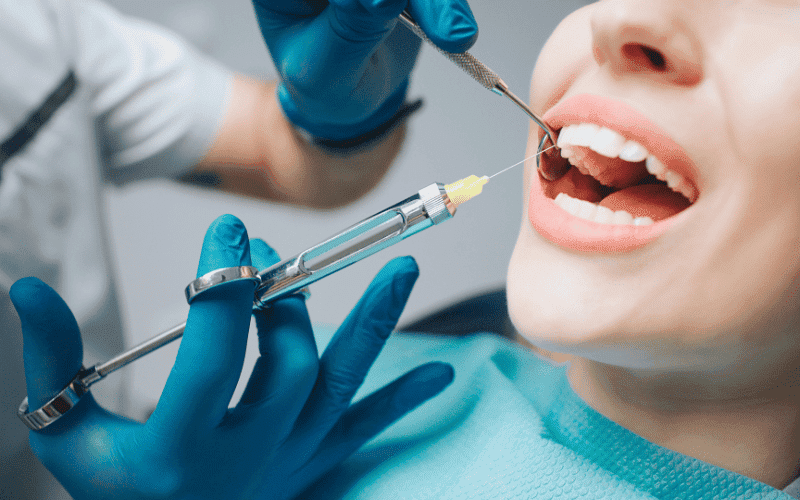
The final teeth to erupt are the wisdom teeth, sometimes referred to as third molars in the mouth, usually between 17 to 25 years old. However, these teeth can often cause problems like overcrowding, impaction (stuck within the jawbone), or infection. In such cases, wisdom teeth removal becomes a necessary procedure.
While the prospect of wisdom teeth removal might sound daunting, modern dentistry offers various anesthesia options to ensure a comfortable and stress-free experience. This guide explores the different types of anesthesia used for wisdom teeth removal in Prairie Village, helping you understand which one might be right for you.
Why Anesthesia During Wisdom Teeth Removal?
Removal of wisdom teeth is a surgical operation that entails extracting the teeth from the jawbone. Depending on the complexity of the extraction, some discomfort or pain is inevitable. Anesthesia helps manage this pain and anxiety associated with the procedure. These reasons explain why dentists use anesthesia during wisdom teeth removal:
- Pain Management: Anesthesia effectively blocks pain signals, ensuring a comfortable experience during the extraction.
- Reduced Anxiety: The procedure can be nerve-wracking for some people. Anesthesia helps alleviate anxiety and promote relaxation throughout the process.
- Patient Comfort: Anesthesia allows the dentist or oral surgeon to work effectively without worrying about patient discomfort or movement.
- Faster Recovery: By eliminating pain and anxiety, anesthesia contributes to a smoother and faster recovery.
Types of Anesthesia for Wisdom Teeth Extraction
Wisdom teeth removal in Prairie Village use several types of anesthesia, each offering varying levels of sedation and pain management. Let’s explore these options:
- Local Anesthesia: Dentists commonly use this type of anesthesia for wisdom teeth removal. A local anesthetic numbs only the specific area where the tooth is being extracted. You will remain awake and conscious during the procedure but won’t feel any pain at the extraction site. You might feel some pressure or tugging, but overall discomfort is minimal.
- Nitrous Oxide (Laughing Gas): Dentists often combine nitrous oxide, also known as laughing gas, with local anesthesia. It’s a mild sedative that produces a feeling of relaxation and lightheadedness. While you will remain conscious, nitrous oxide can help alleviate anxiety and make the time during the procedure pass more quickly. Nitrous oxide’s effects quickly wear off after the following procedure is complete.
- Intravenous (IV) Sedation: When you receive IV sedation, medicine is injected into a vein in your arm. This type of sedation produces a deeper level of relaxation than nitrous oxide. You might be awake but feel very drowsy and have little to no memory of the procedure. IV sedation is often combined with local anesthesia to ensure complete pain control.
- General Anesthesia: General anesthesia puts you into a complete state of unconsciousness during the procedure. You won’t feel any pain or remember the extraction at all. General anesthesia is typically reserved for complex wisdom teeth extractions or for patients with high anxiety who cannot tolerate sedation in any other way.
Choosing the Right Anesthesia for You!
The best type of anesthesia for your wisdom teeth removal in Prairie Village depends on several factors, including:
- Complexity of the extraction: Simple extractions might only require local anesthesia, while complex cases involving impaction or bone removal might necessitate IV sedation or general anesthesia.
- Your medical history: Certain medical conditions might limit the use of specific anesthesia types. Be in constant contact with your oral surgeon or dentist regarding your medical history.
- Your level of anxiety: If you have high anxiety about dental procedures, IV sedation or general anesthesia might be a better option to ensure a more relaxed experience.
Discussing Your Options with Your Dentist or Oral Surgeon:
Consulting with your dentist or oral surgeon in Prairie Village is vital to determine the most suitable anesthesia option for your wisdom teeth removal. They will conduct a thorough examination, review your medical history, and discuss your concerns and preferences. Here are some things to ask your dentist or oral surgeon during your consultation:
- What type of anesthesia do you typically recommend for wisdom teeth removal cases like mine?
- Are there any risks associated with the different types of anesthesia?
- What can I expect before, during, and after the procedure with each type of anesthesia?
By having an open discussion with your dentist or oral surgeon in Prairie Village, you can confidently choose the anesthesia option that best addresses your needs and ensures a comfortable and successful wisdom teeth removal experience.
Additional Considerations with Anesthesia
Here are some additional points to consider before undergoing wisdom teeth removal with anesthesia:
- Fasting Instructions: You might be required to fast for a certain number of hours before the procedure, depending on the type of anesthesia used. Your dentist or oral surgeon will provide specific instructions regarding fasting.
- Transportation: Following general or IV sedation, you won’t be able to drive yourself home. Arrange for a friend or family member to take you home after the procedure and stay with you for the initial recovery period.
- Post-operative Care: Following your wisdom teeth removal, your dentist or oral surgeon will provide detailed instructions for post-operative care. This includes pain management, managing swelling, and proper hygiene practices to promote healing.
Anxiety with the Right Anesthesia for Your Wisdom Teeth Extraction!
Wisdom teeth removal in Prairie Village with the right anesthesia option can be a smooth and comfortable experience. Understanding the various anesthesia types, their benefits, and potential risks will empower you to participate actively in the decision-making process. Discussing your concerns and preferences with your dentist or oral surgeon is key to choosing the most suitable anesthesia method for your wisdom teeth removal procedure.
Remember, a successful and comfortable outcome starts with open communication and a clear understanding of your options. So, breathe easy, make an informed decision, and get ready for a brighter smile minus those troublesome wisdom teeth.
FAQs On Choosing Anesthesia for Wisdom Teeth Removal
1. Will I feel any pain during wisdom teeth removal?
The type of anesthesia used determines your pain experience. Local anesthesia numbs the extraction site, so you won’t feel pain but might experience some pressure or tugging. Nitrous oxide (laughing gas) creates a relaxed state and reduces anxiety, but you’ll likely remain conscious during the procedure. IV sedation and general anesthesia render you unconscious, eliminating pain and memory of the extraction.
2. What factors influence the type of anesthesia recommended?
Your medical history, the intricacy of the extraction, and your anxiety level all play a role. Simple extractions might only require local anesthesia, while complex cases or patients with high anxiety might benefit from IV sedation or general anesthesia. Your dentist or oral surgeon will evaluate your unique demands and suggest the best course of action.
3. Is there any risk associated with anesthesia?
All forms of anesthesia carry some degree of risk, although these are generally minimal. Local anesthesia is considered very safe. Nitrous oxide and IV sedation have mild risks like nausea or dizziness. General anesthesia carries a slightly higher risk but is still regarded as safe when given by a trained expert. Discussing your medical history with your dentist is crucial to assessing any potential risks associated with specific anesthesia types.
4. What to anticipate following the surgery with different anesthesia options?
Following local anesthesia, you’ll recover quickly and be able to go home shortly after the procedure. Nitrous oxide wears off rapidly, allowing for a quick recovery. IV sedation and general anesthesia require a longer recovery period, often with someone driving you home and monitoring you for a while afterward.
5. How can I prepare for wisdom teeth removal with anesthesia?
Follow your dentist’s instructions regarding fasting before the procedure. Arrange for someone to drive you home if undergoing IV sedation or general anesthesia. Discuss any concerns or questions you have with your dentist or oral surgeon beforehand. Being well-informed and prepared can significantly reduce anxiety and contribute to a smoother overall experience.




